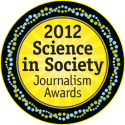Congratulations to winners of the 2012 Science in Society Journalism Awards
-
In the Book category, Seth Mnookin for his book Panic Virus: A True Story of Medicine, Science, and Fear (Simon & Schuster)
-
In the Science Reporting category, "Poisoned Places," by reporters from the Center for Public Integrity (Jim Morris, Chris Hamby, Ronnie Greene, Elizabeth Lucas, Emma Schwartz) and NPR (Elizabeth Shogren, Howard Berkes, Sandra Bartlett, John Poole, Robert Benincasa)
-
In the Science Reporting for a Local or Regional Audience category, "Perilous Passages," by Emilene Ostlind, Mary Ellen Hannibal, and Cally Carswell, published in High Country News
-
In the Commentary or Opinion category, "Ban Chimp Testing," by the Scientific American Board of Editors, published in Scientific American
Winners in each category share a cash prize of $2,500, to be awarded at a reception on October 27, 2012, during the ScienceWriters2012 meeting taking place this year in Raleigh, North Carolina.
The National Association of Science Writers established the Science in Society Journalism Awards to provide recognition — without subsidy from any professional or commercial interest — for investigative or interpretive reporting about the sciences and their impact on society. The awards are intended to encourage critical, probing work that would not receive an award from an interest group. Beginning with the first award in 1972, NASW has highlighted innovative reporting that goes well beyond the research findings and considers the associated ethical problems and social effects. The awards are especially prestigious because they are judged by accomplished peers.
In Panic Virus (Simon & Schuster, 2012), Mnookin tells the story of the dire consequences of the 1998 publication of a subsequently discredited paper alleging that the measles-mumps-rubella vaccine might cause autism. One judge commented that Mnookin "neatly dissects the issues behind the anti-vaccine movement, illuminating this intersection of science, politics and public health. The story is beautifully told, the people in it are compellingly rendered, and the missteps on all sides of the vaccine question told in clear detail…. In the end, the book offers both a telling look at how human beings can complicate even the most straight-forward attempts to protect public health and a warning of the risks to all of us when we choose fear- mongering over good science."
The "Poisoned Places" series was published on the Center for Public Integrity's iWatch News, and broadcast on NPR during November and December 2011. The series covers how toxic air pollution continues to harm communities throughout the nation 21 years after Congress passed an amendment to the Clean Air Act to curb that pollution. The authors reveal how the Environmental Protection Agency maintained a secret "watch list" of some 400 facilities—refineries, steel mills, incinerators, cement kilns and pharmaceutical plants—that continue to release pollutants that cause cancer and brain damage. One judge called the series "a revealing—and dismaying—look at the failures of environmental protection agencies to actually do their job of protecting the American people. The power of the series is partly in the detailed and comprehensive research that reveals a seriously flawed system," said the judge. "But it gains additional power from its creative use of multiple platforms to tell the story and innovative story-telling."
The "Perilous Passage series was published in High Country News on December 26, 2011. Reported by Emilene Ostlind, Mary Ellen Hannibal, and Cally Carswell and photographed by Joe Riis, the series covers scientists' struggles to understand and protect the long-distance migrations of Western wildlife, including the pronghorn antelope. The series explains how migrations are hindered by manmade barriers such as fences and roads and how they can be encouraged by the establishment of wildlife corridors. It details the economic, governmental and political issues that affect establishment of such corridors. One judge called the series "a gripping and vividly written feature story about the pronghorns' amazing long-distance migration through several states in the Northwest." The series "highlights the difficulties that wildlife have in surviving an increasingly congested and fenced-in ecosystem. Both the writing and the photos kept my interest from beginning to end."
"Ban Chimp Testing" appeared in the October 2011 issue of Scientific American. The Board of Editors covers the current status of invasive experiments on chimpanzees and their grim impact on the animals, and outlines the arguments that it is no longer scientifically productive or moral to continue such testing. The commentary also outlines the components of a future policy to protect the animals. One judge called the commentary "a terrific example of clear reporting and social advocacy," saying that the essay "captures the enduring plight of our closest living relatives and offers sober advice on how to help them."
The final judging committee consisted of Alison Bass, author and assistant professor of journalism at West Virginia University; Deborah Blum, author and professor of journalism at University of Wisconsin-Madison; and Sandra Blakeslee, author and science correspondent for The New York Times. The Science in Society awards committee was chaired by Amber Dance, a freelance journalist and science writer for the Alzheimer Research Forum, and Dennis Meredith, a freelance science writer and communication consultant.
In addition to the final committee, NASW thanks the volunteers who served on the preliminary screening committees: Christie Aschwanden (freelance), Glennda Chui (SLAC National Accelerator Laboratory), Lynne Friedmann (freelance), Robin Lloyd (Scientific American), Robin Marantz Henig (contributing writer, The New York Times Magazine), Roberta Kwok (freelance), Maryn McKenna (freelance), Julie Ann Miller (freelance), Steve Mirsky (Scientific American), Christine Peterson (Casper Star-Tribune), Charlie Petit (freelance and Knight Science Journalism Tracker), Adam Rogers (Wired) and Evelyn Strauss (Multiple Sclerosis Discovery Forum).
Entries for next year's competition, for material published or broadcast in 2012, are due February 1, 2013. Entry forms will be available at www.nasw.org in December 2012.
The largest organization devoted to the professional interests of science writers, the National Association of Science Writers fosters the dissemination of accurate information regarding science through all media normally devoted to informing the public. Its 2,221 members include science writers and editors, and science-writing educators and students.

